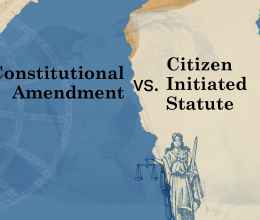Below is our Chief Lobbyist Gary Daniels' opponent testimony on Senate Bill 260. This was delivered to the House Criminal Justice Committee Committee on February 26, 2020.
To Chairman Lang, Vice Chair Plummer, Ranking Member Leland, and members of the House Criminal Justice Committee, thank you for this opportunity to present opponent testimony on House Bill 431.
As you previously heard, HB 431 creates a public database to publicize certain prostitution-related offenses in the hopes public shaming will deter future offenses of this type.
The ACLU of Ohio opposes HB 431 for the same reasons it opposes other bills of this type often before this committee. That is, HB 431 is counterproductive, short-sighted, and continues the Ohio General Assembly's current one step forward, two steps back approach to criminal justice issues and unmet reform. Please consider these four points:
I) Contrary to ongoing reform efforts
Over the past several legislative sessions, there has been growing awareness of, and attention paid to, the difficulties those with criminal records face after they pay their debt to society. Too often, government places hurdles in their way. The more hurdles, the less chance someone has to right their lives. Many who cannot overcome these hurdles struggle, while some of them reoffend or commit different offenses.
In recognition of these struggles and difficulties, the General Assembly has and continues to work to remove these hurdles. These positive efforts include expansion of record sealing and expungement and reducing collateral sanctions, such as those involving professional licensing and drivers' license suspensions, among others.
HB 43 I swings the pendulum back the other way by creating a public shaming database where, long after any time has been served and/or fines paid, those guilty of these offenses will be on public display for their employers, landlords, and loved ones to see. Many for committing a misdemeanor offense. HB 431 is yet another hurdle.
2) A database for every offense
Related to the point above, HB 431 also continues this legislature's unquenchable appetite for criminal offense databases. Back when the creation of sex offender databases was an emergent issue, the ACLU of Ohio warned such databases would be counterproductive and this idea will certainly expand beyond sex offenses. Since then, Ohio created databases and/or registries for certain violent offenses, arson, and animal abuse. In just this legislative session, there are bills to do the same/similar for child abuse, child endangering, and domestic violence (HB 302); and to create a sex offender license plate (SB 217).
Whether or not HB 431 ultimately passes, we are sure to see an ever increasing amount of database and registry bill and laws. We urge rejection of HB 431, in part, because we do not believe public databases provide overall positive benefits and because we fear databases currently for law enforcement only access will someday become public ones. Rejecting HB 431 helps to stem this tide.
3) HIV status included
In Ohio, we have a very arcane HIV solicitation law. It is a felony of the third degree for someone to solicit for prostitution when they know they have HIV. It does not matter if the sex act took place. It does not matter if they took precautions to prevent HIV transmission. It does not matter if both parties are aware of the other's HIV status. By applying HB 431 to ORC §2907.24 offenses, this new database will also publicize at least some Ohioans' HIV status to the rest of the world.
4) Targeting the back end, neglecting the front end
We believe proponents are sincere when they state they support bills like HB 431, in part, because they seek to protect those who engage in prostitution because of their drug addiction and poverty.
In short, increased emphasis on adequately combatting drug addiction and poverty would go a long way towards making bills like HB 431 less relevant. As you all know, Ohio has a long way to go in regard to both these issues.
But, whether it is record sealing, expungement, drivers' license suspensions, or collateral sanctions, much more effort is needed on the front end, which makes back end efforts less necessary.
When The Scarlet Letter was published in 1850, I suspect Nathaniel Hawthorne had no idea his novel would resonate for (at least) 170 more years. Many of us first experienced this novel in a school English or literature class. Others know what a "scarlet letter" refers to even if they never read the book or are even aware of the book's existence. In years past, the utilization of a "scarlet letter" was viewed as a negative. When did that change?
Good intentions do not always lead to good bills. Sometimes the proposed solution causes more problems than it solves. The ACLU of Ohio urges this committee's rejection of House Bill 431.







